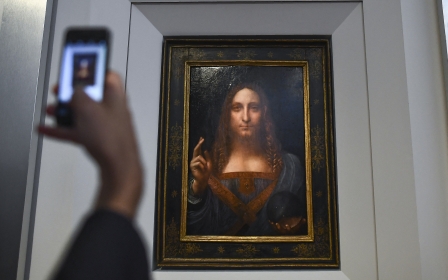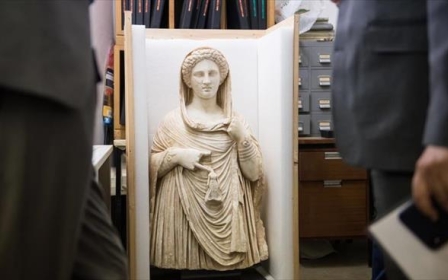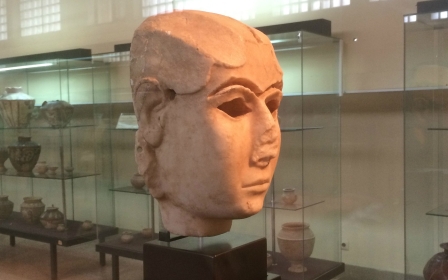Demi Lovato claims to have bought ancient Egyptian artefacts. Experts aren't so sure

Ancient artefacts from the Middle East have often ended up in museums around the West, sometimes as a result of colonialism, looting or dodgy dealings.
Now a series of millennia-old Egyptian items appear to have found a new home: that of American singer and actor Demi Lovato. Or so the star claims.
New MEE newsletter: Jerusalem Dispatch
Sign up to get the latest insights and analysis on Israel-Palestine, alongside Turkey Unpacked and other MEE newsletters
“I am so excited, some really incredible things came in the mail today. These are ancient Egyptian artefacts,” the singer posted on Instagram Stories over the weekend.
Lovato explained that the artefacts were acquired from a website called "Museum Surplus".
“These are my certificates of authenticity. Some of these pieces are literally thousands of years old,” the 29-year-old excitedly continues.
They showed documentation with fun blue borders, which would not look out of place in an employee of the month certificate.
One of the authentications claimed to be for a cuneiform tablet from the Babylonian and Assyrian periods, dating from between 2000 and 600 BCE.
“My mind is literally blown right now, and I’m so excited,” the Camp Rock star concluded, writing the caption "Starting my own museum y'all." But their excitement was not echoed by experts.
‘Pre-gnawed dog biscuits’
Erin Thompson, an art crime professor and author, cast doubt on Lovato’s purchases in a damning Twitter thread.
“These are not so much ‘cuneiform tablets’ as ‘pre-gnawed dog biscuits’. Also, you'd better hope they're fakes - genuine tablets like this have frequently been looted from Iraq, including to support insurgent groups like ISIS,” she said, referring to the Islamic State group.
Islamic State fighters damaged and looted pre-Islamic heritage when they took over swathes of Iraq and Syria nearly a decade ago, resulting in artefacts being sold internationally on the black market.
Peter Campbell, an archaeologist and lecturer currently teaching a course on international heritage crime, also took to Twitter to scrutinise Lovato’s acquisitions.
“International markets have seen an influx of looted artefacts from Iraq and Syria following the US invasion and Daesh - artefacts like cuneiform tablets. Following the Arab Spring, widespread looting in Egypt led to an influx of Egyptian artefacts onto the market,” he said.
He explained that the trafficking of cultural heritage post-1970 was illegal, and that anyone purchasing items with a provenance prior to that time should do due diligence to ensure purchases have not been not recently looted, or fake.
On Lovato’s certificates, he said: “I have never seen provenance like this. None of the critical information is included. Were these exported in 1869 or last year? Where are the copies of the export permits? Who owned them previously?”
He went on to ask buyers to question why ancient Egyptian and Iraqi artefacts are available cheaply online.
“It’s very cool to hold something ancient in your hands. But ask yourself - why should I be able to own this? What path did it take to get here? Were people exploited (or killed) for it to get here?”
Several users took to social media to criticise Lovato for owning the (alleged) artefacts.
“Assyrians were literally slaughtered to death and forcibly removed from their ancestral homeland, but thank god Demi Lovato is here to buy stolen artefacts and preserve the culture,” one user wrote.
“Why the fuck does Demi Lovato have my ancestors' artifacts?” another succinctly asked.
Middle East Eye delivers independent and unrivalled coverage and analysis of the Middle East, North Africa and beyond. To learn more about republishing this content and the associated fees, please fill out this form. More about MEE can be found here.





